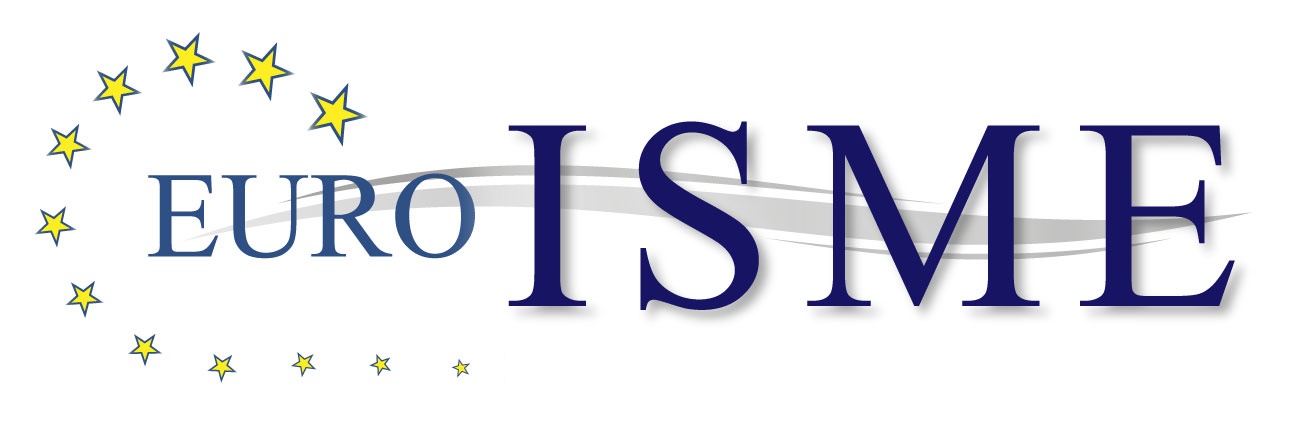7th EuroISME Annual Conference
30 May – 2 June 2017
Royal Military Academy, Brussels
Conference Report
“Rege duce pro jure et honore” This motto reminds all students and members of the Royal Military Academy to the ultimate goal of the higher academic education i.e. committing themselves at the service of the fatherland and its King, by pursuing honour and justice.
Since 1909, the RMA is located in Brussels noble Avenue de la Renaissance, not far away from the famous Parc du Centenaire. Its infrastructure not only constituted a significant historical frame, but also a particularly prestigious scene for Euro-ISME’s 7th Annual Conference.
In addition, the conference was outstandingly backed by our hosts : Euro-ISME is exceedingly grateful to the all involved members of the Academy Staff for their active support and for giving access to the excellent facilities. All participants agreed that our association once again managed to select a very spectacular venue!
Moreover, the Board had the right touch when programming the conference theme : certain events of recent years and months, especially the ongoing civil wars in Syria, Iraq and Ukraine made it exceptionally topical!
This is why EuroISME consistently promotes the search for principles of ethical guidance in military operations.
RESTRAINT IN WAR: ESSENTIAL FOR A LASTING PEACE ?
At our very high-flying conference in Brussels we discussed questions such as – ‘To what extent does respect for humanitarian law and military ethics – the right intent – facilitate the conclusion of peace, and by implication, does such respect serve ius post bellum?’… and … Should the technical rules of ius in bello and principles of ius post bellum be reinforced through conduct based on human virtues and values, such as altruism, magnanimity and forgiveness, in order to make a lasting peace possible?’
To create the conditions for a just and lasting peace, we have to consider the relationship between ius ad bellum, ius in bello and ius post bellum. Some say that the criteria of ‘right intent’ and ‘reasonable prospect of success’ — reminiscent of the just war tradition — have served as the driving influences to promote both ius in bello as well as ius post bellum.
Conference Items
During the Opening Session, the participants were addressed by Major General Lutgardis Claes who was the first woman to occupy the commanders post at the Royal Military School founded in 1834. The “inaugural speech” was given by Prof. Dr. Carl Ceulemans from Belgium entitled “Fighting Well for a Just Peace?”
The conference was also the occasion for the presentation of the recently published 3rd Volume of the Euro-ISME Book Series on International Studies in Military Ethics entitled “Didactics of Military Ethics – From Theory to Practice”, edited by our eminently respected member Professor Dr. Peter Olsthoorn from the Netherlands Defence Academy.
In his excellent Keynote Speech on “The Future of Warfare”, Jamie A. Williamson, Head of the Relations with Arms Carriers Unit at the International Committee of the Red Cross (ICRC), gave inventive answers to the question if “technical evolution and new diplomatic rules will offer a new interplay for law & ethics?”
The hightlight of this years international conference was the keynote speech given by the Director General of the EU Military Staff, Lieutenant-General Esa Pulkkinen, in which he gave a deep insight in EU/MS’s experience in assisting war-torn societies to turn to a just and lasting peace, addressing successes achieved, errors and mistakes from which the EU must learn, how military ethics can really be supportive and what Europe’s ambitions for the near future should be.
The DGEUMS was than rejoined by Brigadier General Franz Pfrengle from the HQ EUROCORPS, Mr. Emmanuel Jacob, President EUROMIL and Mr. Jon McCourt from the Peace and Reconciliation Group in the City of Derry, Northern Ireland. Their – partly even emotionally affecting – real life experiences in different operational and peace time situations strongly impressed all participants and animated lively discussions.
The official Annual Dinner Banquet was the most suitable moment for the President Benoît Royal to hand out the trophy to the winner of Euro-ISME’s prize for the best student thesis written on military ethics. The prize has been awarded for the first time and went to Ms. Samantha Hope from the United Kingdom for her outstanding work on the question “Is it possible to prevent sexual violence against women, men and children, or only to manage the after-effects?
More about the Euro-ISME Prize Rules and the laureate as well as a downloadable pdf-version of her thesis on our special “Thesis Prize” page.
The second conference day begun with a “Special Panel”, dedicated to the ongoing Peace-Process in Colombia : moderated by Mr. Olivier Lagarde, peace-worker at the Center for Research and Popular Education (CINEP). Mr. Victor Barrera, researcher and team co-ordinator of CINEP, presented his views on the “Relations between civil and military personnel for the construction of peace”.
The panel was closed by a vibrant statement of the Ambassador of Colombia, S.E. Jose Rodrigo Rivera Salazar, thanking the EU for diplomatic and political support during the peace negotiations and calling for endurance and faith until the achievement of reconciliation.
The meeting again also provided the opportunity to hold “the Ordinary General Assembly”. The members unanimously approved the annual reports of the executing directors and of the treasurer and they (re-)elected the members of the Board of Directors for the next tenure of office.
But the most important item on the Agenda of this year’s OGA was the adoption of revised statutes and internal provisions, including a “Code of Conduct & Complaint Procedure (CC&CP), which got the unanimous assent under the applause of the present members.
